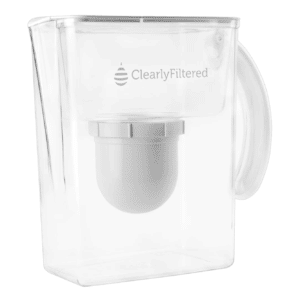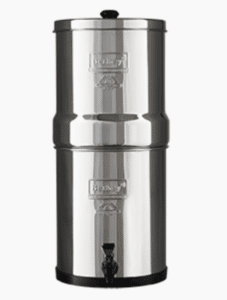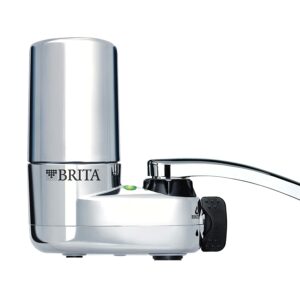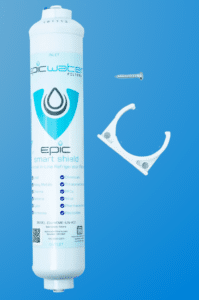Looking for an apartment water treatment unit? You’ll be happy to learn that there are various models to choose from. They’re all different in size, price, and even filtration media, so they serve different purposes, though, so the trick is to figure out what your priorities are.
To help you out, we’ll take you through the best filters for your apartment in five categories, so you can find the one that most closely matches your needs.

- Contaminants Removed – 84 contaminants
- Warranty – No

- Contaminants Removed – 365+ contaminants
- Warranty – Limited lifetime warranty

- Contaminants Removed – 200+ contaminants
- Warranty – Lifetime warranty

- Contaminants Removed – Lead, chlorine, asbestos, particulates, Benzene, and more
- Warranty – No

- Contaminants Removed – Chlorine, copper, lead, mercury, PFOA, and uranium
- Warranty – Yes, but the length isn’t specified
Apartment Water Filters
AquaTru Reverse Osmosis Water System – Best RO System

- Contaminants Removed – 84 contaminants
- Warranty – No
- Price – $449
- Very effective device removing almost all common contaminants from the water
- Easy to maintain and replace filters
- Long-lasting (capacity: 1,400 gallons for the first three filters; 800 gallons for the final filter)
- The most expensive unit on our list
The AquaTru is a great water filtration system for any household. It’s compact, requires no setup or installation, and is remarkably powerful for its size.
It uses a 4-phase filtration process to ensure all of the contaminants in the water are removed.
- The first phase is the mechanical pre-filter. This phase removes large sediment particles from the water, as well as cloudiness.
- The second phase is the activated carbon pre-filter eliminating chlorine (99%) and chloramine traces from water.
- The third phase is the reverse osmosis filter that catches and removes inorganic pollutants.
- The fourth and final step is the activated coconut shell carbon filter that stops organic contaminants.
All these filtration phases and the thorough water purification process make this the most powerful unit on our list. While it may sound like the process is long, that’s not the case: it only takes 15-20 seconds.
This countertop RO model is also effortless to use since you only need to plug it into a power socket and fill the reservoir with water. After that, press the start button, and the device will take care of the rest.
The maintenance procedure is also simple. The media comes in cartridges inserted in separate slots inside the filter. You rotate the cartridge one way to secure them in the slot and the other way to dislodge them from the slot when it’s time to replace them. As for the reservoir, use a few drops of dish soap and a sponge to clean the inside walls gently every week.
The RO system and the two pre-filters are capable of purifying around 1,400 gallons of water, while the activated coconut shell is able to process about 800 gallons.
But all these valuable features come at a steep price of $449, making it the priciest item on our list and one of the most expensive countertop water treatment units on the market.
Clearly Filtered Water Pitcher – Best Water Pitcher

- Contaminants Removed – 365+ contaminants
- Warranty – Limited lifetime warranty
- Price – $81
- Very easy to use and takes virtually no space
- Lasts around 6 months
- Comes with a 30-day money-back guarantee
- The replacements are expensive and not very powerful
Pitchers are popular thanks to their ease of use, and the Clearly Filtered water pitcher is no exception.
If you’re looking for a device that provides a clean glass of water and fits in any refrigerator, this is the right unit for you.
The Clearly Filtered water pitcher is the definition of simplicity. It has very few components and no moving parts. The unit has a lid at the top that covers the reservoir where you pour in the water. The water then seeps through the reservoir into the semi-spherical filter just underneath.
This model has three filtration stages, all containing different filtration media. The woven mesh screen neutralizes large sediment particles, and the granulated coconut carbon reduces chlorine. The final stage is the composite shell that uses 7 proprietary filtration materials to reduce commonly found contaminants in the water.
Once the water passes the filter, it enters the large basin at the bottom. The water remains in the basin until you pour yourself a glass.
The basin stores around 80 ounces of water, approximately 10 glasses. As for the filters, they have a lifetime of about 100 gallons or 160 full containers. This should last around 6 months if you use the pitcher once per day or 3 to 4 months if you use it more frequently.
The product reduces 99% of all fluoride, microplastics, PFAS/PFOA, and lead in your water, but its efficiency depends on the state of the water it’s treating.
Water that’s too contaminated will either clog it or won’t be purified. If you notice discoloration or smell from the water even once it’s passed the filter, you’ll need a more robust unit.
Luckily, the pitcher comes with a 30-day money-back guarantee, so you’re able to return it if it doesn’t meet your expectations.
The major flaw of this pitcher is the price of its replacements. A single one will cost you $49.50, more than any other replacement filter on this list. For more context, the price of a single filter is more than half the price of the pitcher itself.
Big Berkey Water Filter – Best Gravity Filter

- Contaminants Removed – 200+ contaminants
- Warranty – Lifetime warranty
- Price – $367
- Very large 2.25-gallon chamber for clean water
- The proprietary filtration media eliminates most organic and inorganic materials from the water
- Long-lasting filters
- Prolonged filtration process
The Big Berkey is a gravity unit with two chambers. The top chamber is where you pour water into the unit, while the bottom chamber is where the clean water is collected.
The device is equipped with two filters composed of high-grade coconut shells along with a blend of 5 proprietary media capable of eliminating herbicides, pesticides, VOCs, silt, rust, pharmaceuticals, sediment particles, and various organic and inorganic substances from your drinking water.
The Big Berkey is efficient and has an impressive lifespan. One unit can treat up to 3,000 gallons of water, while a pair purifies approximately 6,000 gallons before requiring replacement.
While they may seem pricey at $166, the math works out to less than two cents per gallon of purified water, which is affordable.
As you may have assumed by the name, the Big Berkey model has the largest water container on our list. At full capacity, this unit holds 2,25 gallons of water, more than enough to get most people through a day or two.
However, with a flow rate of around a gallon an hour, the Big Berkey will finish the treatment process in about 2 and a half hours.
Many people won’t have an issue with the slow flow rate since they are able to set the unit to run ahead of time, but some may not want to wait for hours.
Fortunately, you don’t have to wait for the container to be entirely full before pouring yourself a glass. Use the spigot whenever you want, regardless of how much water you have in the lower chamber. Do note that you’ll still need to wait at least 10 – 15 minutes before you can get a glass of water.
Brita Water Filter for Sink – Best Faucet Filter

- Contaminants Removed – Lead, chlorine, asbestos, particulates, Benzene, and more
- Warranty – No
- Price – $30.89
- It’s effortless to install and adjust
- The replacement filters are reasonably priced
- The filter is easy to use, and the replacements are easy to change
- Less effective compared to the other models on our list
The Brita sink model is an excellent choice for anyone looking for a faucet filter.
The unit is easy to place; all you need to do is fit it on the end of your faucet by clamping it through the hole right at the top behind the filtration cylinder. There’s a crank at the end of the filter right below the faucet insertion point that you can turn to tighten or loosen the device.
Once you’ve tightened it, operating it is a matter of pressing a button.
The filtration media is in the large cylinder above the Brita logo. While the media’s contents aren’t mentioned, we know it’s capable of removing 99% of lead, chlorine, asbestos, sediment particles, and more.
Brita’s capacity is around 100 gallons, which should last three months if you use it conservatively. The most important thing is to remember to turn it on when you need a drink and turn it back off when you’re just using the water to wash or rinse dishes to prolong its life.
But, even if you use it frequently, replacements are exceptionally affordable. You can get 3 for $35.99, which makes them the most affordable replacement filters on our list by a large margin.
They’re also effortless to replace, as you only need to detach the old one from the top of the unit and slot in a new one.
While the Brita unit is easy to use and treats water much more quickly than the Big Berkey gravity model, it’s less effective.
Brita removes common water contaminants like chlorine or lead but will struggle with other heavier pollutants. As a result, it won’t remove them from the water at all, or the removed amount will be so minute that there won’t be any significant change to the water quality.
All in all, it’s a great filter if you only need to remove chlorine, but you’re better off with something like the Big Berkey or the AquaTru if you live in an area where the water has a lot of contaminants.
Epic Smart Shield External Refrigerator Filter – Best inline Water Filter

- Contaminants Removed – Chlorine, copper, lead, mercury, PFOA, and uranium
- Warranty – Yes, but the length isn’t specified
- Price – $56
- Compatible with all refrigerators with a built-in ice maker or water dispenser
- Uses an effective 2-stage treatment process
- Long-lasting
- The installation takes a bit longer than internal models
The Epic Smart Shield external refrigerator unit is the smallest filter on our list. It’s a small cylindrical container that’s 10.5″ x 2.5,” and you can put it anywhere thanks to its compact size.
However, it needs to be attached to the outside of the fridge rather than in an interior slot like many other refrigerator units. But thanks to this mechanism, you can install it on any refrigerator with an ice maker or a water dispenser. In contrast, internal models are only compatible with specific fridge models and brands.
The installation itself is straightforward. All you need to do is attach one part to the water line that runs to the refrigerator and the other part to the input valve where said water line was initially supposed to connect. You may also want to use some zip ties or a string to suspend the device so that it doesn’t just hang, putting unnecessary pressure on the water line.
Epic Smart Shield uses a 2-stage filtration process involving a hollow fiber microfilter membrane and an activated carbon fiber block. The first stage eliminates microbiological threats like viruses and bacteria, while the second stage tackles heavy metals, chlorine, cysts, and other common contaminants.
This model gives you a filter life of 365 gallons, lasting around two years. Of course, the actual life expectancy will vary depending on how often you use the ice maker or water dispenser, but you should be able to get at least a year and a half, even if you’re liberal with the amount of ice you put in your drinks.
The only real issue that people may have with this product is that it’s an external unit. As mentioned, this makes it compatible with any fridge, but the installation process is more complex than with internal devices.
Types of Apartment Water Filters
This guide covered five types of apartment water treatment units, including a countertop reverse osmosis system, water pitcher, gravity, faucet, and inline refrigerator filter.
We want to note that there are many other types of filtration units that may also be used in an apartment, and there are even many more subtypes and variations than the devices we picked that may work for your particular conditions.
However, we chose the most popular and convenient models.
Plus, we believe our picks are varied and versatile enough for anyone to be able to find their ideal match.
How Do the Different Apartment Water Filters Work?
These devices work in different ways.
Countertop Reverse Osmosis Filter
Countertop products like the AquaTru are portable and usually placed on a surface within the kitchen. These units must be plugged into a power socket to work.
Once the device is plugged in, you just push the start button, and the filtration process will start automatically. The water is passed through 4 different stages, each removing specific contaminants.
The filtration process is very thorough and removes most contaminants that may be found in your drinking water, like lead, chlorine, fluoride, PFAs, nitrates, and others. Surprisingly, it’s also very quick, as it only takes 10 – 15 seconds from start to finish.
Water Pitcher Filter
Water pitchers have their filtration reservoir at the top. The water is poured into the reservoir, and gravity takes it into the semi-spherical filter below it. There, the water is treated and goes into the basin, where it stays until you need a glass.
Gravity Filter
Gravity units usually have two chambers. The upper chamber is where the unfiltered water goes, and the bottom chamber is where the clean water is stored once it goes through the purification process.
Once the top chamber is filled, the water will automatically go through the device and pass into the bottom chamber. The process is slow, but you can use the sprout to pour yourself a glass of water while the purification process is still ongoing.
Faucet Filter
Faucet models are small devices that need to be attached to the end of the faucet. For instance, the Brita requires a single lithium battery for power, but other than that, its setup doesn’t need any connections or tools. You just need to flip a switch to turn it on.
The device works when the light is on, while the water flows through the unit without passing the actual filter when it’s switched off. Turning it on and off will extend its life, so remember to only turn it on when you need clean drinking water.
Inline Water Filter
Unlike standalone filtration units, inline water treatment products are installed directly into your home’s plumbing, effectively treating water as it flows through the pipes. They may be used on a single sink or refrigerators with an ice maker or water dispenser. The latter is a good choice for older refrigerator models that don’t have built-in filters.
External inline water units need to be attached to the water hose at the back of the fridge. To do this, turn off the refrigerator and disconnect the water hose. Attach the hose to one end of the unit, and attach the other end of the device to the refrigerator port where the hose is supposed to connect.
We recommend using zip ties or a bit of string to suspend the unit on something so that it doesn’t pull on the hose as it hangs.
Advantages and Disadvantages of Each Filter
All the apartment filters on our list have their strengths and weaknesses. We have made an effort to summarize and explain the pros and cons of each model type to help you figure out what to expect from them.
Countertop Reverse Osmosis Filter
Advantages – Reverse osmosis systems are known for being very thorough, and the countertop models are no exception. They have very effective filters and other useful features like adjustable filtration modes, timers, and Bluetooth connectivity that give them an edge over other models.
Disadvantages – The effective filters and other helpful features come at the cost of a higher asking price. Many RO countertop systems are reasonably priced for their quality. Still, most of them are much more expensive than any other apartment filtration unit.
Water Pitcher
Advantages – These items are very compact and easy to maintain. All you need to do to clean them is to use a sponge and a bit of soap. The water pitchers themselves are also affordable.
Disadvantages – Pitchers don’t have strong filters. While they are typically effective at eliminating common water contaminants such as chlorine, lead, and certain heavy metals, water filtration systems have a limit to the amount they can remove before becoming clogged. So, they shouldn’t be the first choice for people living in an area with highly polluted water.
Gravity Filter
Advantages – These devices have very few moving parts, making them easy to maintain and clean. The high-grade coconut shell of the Big Berkey removes most types of chemical contaminants, as well as sediment, silt, and other common water pollutants
Disadvantages – Gravity units are generally very slow. For example, the Big Berkey model on our list has a flow rate of a gallon a minute. Tall units like the Big Berkey also take up quite a bit of vertical space on the counter.
Faucet Filter
Advantages – Faucet models are effortless to install. They must be attached to the end of your faucet, and they automatically treat the water that passes through them once turned on. They’re also one of the cheapest, if not the cheapest, water treatment units.
Disadvantages – Similar to pitchers, faucet devices remove lead, chlorine, and other contaminants from the water. Still, they easily get clogged if the water is highly polluted or the filter isn’t changed regularly. The placement of these devices also makes them easy to hit and break with your dishes or even your hands.
Inline Water Filter
Advantages – Inline refrigerator models are small and easy to install. They don’t take up any space or require maintenance. They’re also affordable, and it’s rare to find an inline product with a price in the triple digits. Additionally, they tend to last for around 6 months or more, with certain brands able to provide filtration for a year.
Disadvantages – The only disadvantage that inline water filters have is that they’re limited in terms of functionality. They only remove a limited number of contaminants and don’t have removable cartridges, so you need to replace and reattach the device once the old one runs out. External products are also more annoying than internal ones since they’re trickier to install.
Frequently Asked Questions
Here are what we found to be the most commonly asked questions on the topic of apartment water filters.
The cheapest apartment water treatment unit we found was the Brita faucet model at $30.89. Not only is it the most cost-effective product on our list, but it’s one of the most affordable methods to remove contaminants.
Countertop RO systems usually start at around $100 and can go up to $600.
Water pitchers are generally priced between $30 and $200.
You can find gravity units for as little as $100 or as much as $500.
Faucet filters are, without a doubt, the most affordable on our list, as you can get them for anything between $15 and $30.
External inline water filters range from $15 to $150.
None of the countertop models on our list require any installation. The RO unit needs a power source to function, whereas the gravity model and the pitcher don’t even need that. Simply fill the containers with water, and the filters will do the rest.
Faucet devices need to be attached to the end of the faucet. This requires you to loosen the attachment point, put the item on the end of the faucet, and tighten it in place. Now you just need to switch it on, start the water, and the filtration process will begin.
And finally, we come to the external inline models. First, turn off the refrigerator. After you’ve done that, swirl the fridge so that you have easy access to the back. Once here, you’ll find the water line leading to the fridge. Once you’ve located it, you’ll need to detach it from the fridge.
Next, connect the water line to the in-line device and attach the device to the injection port on the fridge. It’s advisable to use a bit of string or zip ties to secure the purifier in the back of the refrigerator, but that’s entirely optional.
Once the product is in place, we’d suggest taking it for a test drive to ensure it works. Also, ensure that the filter is attached correctly and that nothing leaks while you’re using the ice maker or the dispenser.
Conclusion
The AquaTru Reverse Osmosis Water System is a comprehensive filtration system that’s an excellent option for anyone living in an area with very polluted water.
The Clearly Filtered Water Pitcher is simple to use and a great option for anyone who just wants a clean drink of water without using overly expensive and complicated filtration units.
The Big Berkey Water Filter takes up a lot of space, but it’s a very effective filter that’s less costly than the AquaTru.
The Brita Water Filter for Sink is the best option for anyone looking for a cheap filter to eliminate chlorine and lead from their water supply.
The Epic Smart Shield External Refrigerator Filter is the best option if you have a refrigerator with a built-in ice maker or water dispenser.